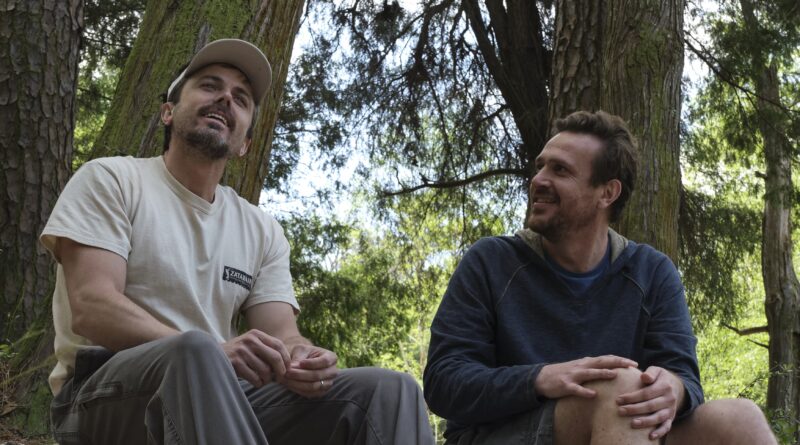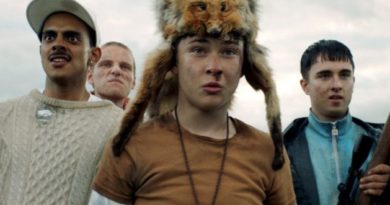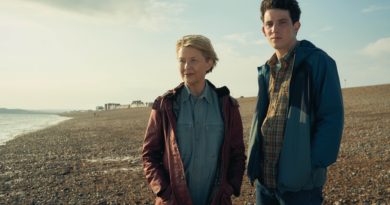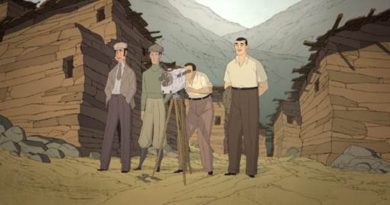Casey Affleck stars in inspiring true story – Our Friend
Our Friend tells the inspiring and extraordinary true story of the Teague family—journalist Matt (Casey Affleck), his vibrant wife Nicole (Dakota Johnson) and their two young daughters—and how their lives are upended by Nicole’s heartbreaking diagnosis of terminal cancer.
As Matt’s responsibilities as caretaker and parent become increasingly overwhelming, the couple’s best friend Dane Faucheux (Jason Segel) offers to come and help out. As Dane puts his life on hold to stay with his friends, the impact of this life altering decision proves greater and more profound than anyone could have imagined.
Black Bear Pictures presents A Scott Free production; Our Friend. A film by Gabriela Cowperthwaite based on Matthew Teague’s National Magazine Award winning article (originally published in Esquire Magazine), Our Friend is directed by BAFTA-nominated director Gabriela Cowperthwaite (Blackfish, Megan Leavey) and written by Brad Ingelsby (American Woman, The Way Back).
Jason Segel (The End of the Tour, Forgetting Sarah Marshall), Dakota Johnson (Fifty Shades franchise, Suspiria) and Academy Award® winner Casey Affleck (Manchester By The Sea, Light Of My Life) star.
“During filming I was prepared for a little bit of unreality. There was the initial reality of Nicole’s death, there’s my best presentation in my story; then there’s Brad’s retelling, Gabriela’s vision and finally the actors doing their job. By that point, we’re several layers removed from reality—so it was shocking to me how close and how real things have been.”
– Matthew Teague
“In the aftermath of Nicole’s illness and death, I really didn’t want to think or write about it right away,” says Teague. “But a year later I was ranting to my editor at Esquire, Mark Warren, about how we don’t talk honestly about death in our culture.
“You have the movie versions — Leo DiCaprio drifting peacefully to the bottom of the sea in Titanic, or the cowboy with the sort of noble death, or we use euphemisms like ‘so and so bought the farm.’ These are ways we avoid speaking directly about mortality; it left me unprepared for the reality of how it was.
“And he said: ‘I think you should write about this.’ I replied: ‘I don’t know. Every story needs a hero and I can’t be the hero of this story.’ It had been too hard. I fell apart from beginning to end. ‘Well,’ he said, ‘what about your friend, Dane?’ And I thought, yeah, okay. Dane is my hero, so that’s how the magazine story came to be.’
“Teague confides that as he wrote the story, ‘I honestly thought it would be too mundane, too every day, because [Nicole’s] was not a glamorous or exciting death; people die this way every hour. It’s an everyday glimpse at mortality.
“But Mark said, ‘If you do the everyday thing right it becomes the universal thing.’ Then he said, which I’ll never forget, ‘a story like this has the power to split the atom,’ which was the first time I realized that maybe there is something here that people will connect with.
“Once the story came out there was a flood of response from people who had lost loved ones, or were caretaking—exhausted people, broken-hearted people, and I felt like maybe, by baring my own soul, I had helped these people, and that was really gratifying. It really touched me.
The story came to the attention of producer Michael Pruss at Scott Free Productions who recalls how “my good friend, Brad Ingelsby [the screenwriter of this film] and I both followed Matthew’s work as a journalist. One day Brad called and asked, ‘Have you read Matthew Teague’s piece in Esquire? It’s a remarkable story of grief and loss and friendship and the enduring power of love. I think there’s something special here. Would you investigate it and read it?’
“I did and was equally moved, so I reached out to Matthew Teague. We had a number of really interesting phone conversations about his life, what he’d been through and the process of creation that came from this awful tragedy that he and his children had suffered through.
“After a while Matthew asked, ‘What makes you the right person to tell my life story?’ And, of course, that’s an incredibly honest and legitimate question to ask a film producer. I said that all I could say is that I’d experienced grief and loss in my life and shared that my younger brother died when he was eighteen.
“It had been a very tough time for my parents and me and I told him how he’d articulated so many things that I had felt—the process of grieving and healing and the journey between those two things—in a way that was powerful and universal. I hoped he’d see me as someone he could trust with his story.
“He said that it was still a very fresh wound in his life and that the journey still continued for him and his children. When we spoke again he said, ‘I think this is still too soon.’ So I thanked him for considering, wished him all the best and said that “I hope you and your children heal and, if nothing else, it’s been an honor to get to know you a bit.’”
Teague remembers that “after the story came out there was a wave of interest. Any good magazine story ends up with a wave of interest from movie makers. And I said, no, no, no, no. I didn’t want to do it. I wanted to keep it to myself, or if I was ever going to [see it adapted] I wanted to write it myself.
Then after a lot thought, I realised, this one may be too close for me to view objectively and write. So after about a year and a half I called back Michael Pruss at Scott Free. He was the only one I called back because he had not just written to say ‘Hey, I like your story, I want to make a movie.’
Michael had written to say that he had some tragedy in his own past that led him to feel strongly about the story. So I called him back and said, “Are you still interested in this? You’re the only one I’d want to do it.” And, he said, “Yeah.” And so, we got started.”




